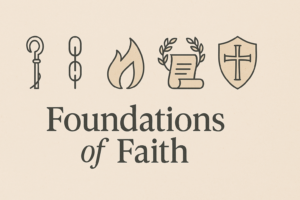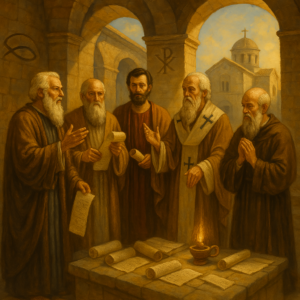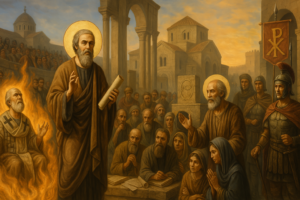Estimated reading time: 15 minutes
Key Takeaways
- The early church fathers profoundly shaped Christian doctrine and traditions during the first six centuries.
- Their writings provided a theological foundation that has supported the Church for nearly two millennia.
- The Nicene Creed was a pivotal contribution, establishing major Christian tenets that unite believers to this day.
- The Apostolic Fathers had direct links to the apostles, preserving apostolic teaching.
- Figures like Ignatius of Antioch, Irenaeus of Lyons, Tertullian, Origen, Polycarp, and Justin Martyr made significant contributions through their writings.
- Early Christian writings helped shape the Church’s identity, preserving orthodoxy and unifying Christianity.
- The early church fathers contributed to defining core doctrines such as the Trinity.
Introduction
The
early church fathers were the influential theologians and Christian writers who established many of the doctrines and traditions of the Church during the first six centuries. These remarkable men served as bridges between the apostolic age and the medieval period, helping to shape Christianity as we know it today.
Their writings and teachings had a critical impact on the development of Christian doctrine. They clarified, defended, and expanded upon the teachings found in Scripture, creating a
theological foundation that has supported the Church for nearly two millennia.
One of the most pivotal contributions of these early Christian thinkers was the
Nicene Creed. This important statement of faith emerged from the ecumenical council convened in Nicaea in 325 AD. The creed established major Christian tenets regarding the nature of Christ and the Trinity that continue to unite believers across denominations to this day.
Early Church Fathers History: From Apostles to Augustine
The early church fathers span a rich historical period beginning with those who knew the apostles personally and extending through the first several centuries of Christianity’s development.
The earliest among them, often called the
Apostolic Fathers, lived during the late first and early second centuries. These included figures like
Clement of Rome, who may have known Peter and Paul, and whose letter to the Corinthians (around 96 AD) is one of the earliest Christian writings outside the New Testament.
Following the Apostolic Fathers came the Apologists of the second century, including
Justin Martyr and
Irenaeus of Lyons. These defenders of the faith responded to critics and helped clarify Christian teaching against false ideas.
The third through fifth centuries saw the rise of systematic theologians like
Origen,
Tertullian,
Athanasius, and the Cappadocian Fathers. Their work addressed complex theological questions about Christ’s nature and the Trinity.
The early church fathers’ era culminated with influential thinkers such as
John Chrysostom,
Jerome, and
Augustine of Hippo, whose writings on Scripture, morality, and theology shaped Christian thought for centuries to come.
The Apostolic Fathers: Direct Links to the Apostles
The
apostolic fathers hold a special place in Christian history due to their close connection to the apostles themselves. These early Christian leaders either knew the apostles personally or were taught by those who did, creating a living link to Jesus’s first followers.
Among these apostolic fathers,
Polycarp of Smyrna was said to be a disciple of John the Apostle.
Ignatius of Antioch likely knew several apostles, and
Papias of Hierapolis claimed to have gathered teachings directly from disciples of Jesus.
Their proximity to the apostolic age gave these early church fathers unique authority in the forming Christian communities. They helped establish church governance structures, worship practices, and interpretations of apostolic teaching that would shape Christianity for generations.
The writings of the apostolic fathers reveal a Christianity still working out its identity yet firmly rooted in the teachings of Jesus and the apostles. They show the early church tackling practical matters of community life while preserving the core gospel message.
Apostolic Church Fathers and Their Contributions
The
apostolic church fathers made notable contributions that helped Christianity survive and flourish in its earliest days. They faced significant challenges, including persecution from outside and false teaching from within.
One of their primary contributions was interpreting the Scriptures faithfully. They carefully preserved the teachings handed down from the apostles, distinguishing authentic Christian doctrine from the many competing spiritual ideas of their time.
Additionally, these early leaders vigorously combated heresies that threatened to distort the Christian message. Figures like
Irenaeus confronted Gnosticism, which denied Christ’s full humanity, while others addressed various misunderstandings about Jesus’s nature and the resurrection.
The apostolic church fathers also established patterns of church leadership and worship that provided stability during a time of tremendous growth and pressure. Their writings reveal how early Christians celebrated communion, baptized converts, cared for the poor, and organized their communities.
Key Early Church Fathers and Their Writings
Saint Ignatius of Antioch: Martyr and Bishop
Saint Ignatius of Antioch stands as one of the most inspiring figures among the early church fathers. As the bishop of Antioch in Syria during the early second century, he led one of Christianity’s most important early communities. His life ended dramatically when he was arrested and transported to Rome for execution around 108 AD.
What makes Ignatius remarkable is that during this journey to martyrdom, he wrote seven profound letters to various churches. Rather than focusing on his impending death, he used his final days to strengthen and encourage Christian communities.
In his letters, Ignatius emphasized church unity under the leadership of bishops, warned against heretical teachings, and affirmed the reality of Christ’s humanity and divinity. He famously wrote:
“I am God’s wheat, and I am to be ground by the teeth of wild beasts, so that I may become the pure bread of Christ.”
The courage and theological clarity Ignatius displayed while facing death has inspired Christians for nearly two thousand years, making him one of the most influential early church fathers.
Ignatius of Antioch Writings and Their Impact
The writings of Ignatius of Antioch had a profound impact on the Church’s understanding of sacraments and ecclesiology (the study of the Church itself). His seven authentic letters—to the Ephesians, Magnesians, Trallians, Romans, Philadelphians, Smyrnaeans, and to Polycarp—provide valuable insights into early Christian beliefs and practices.
Ignatius consistently emphasized the importance of the Eucharist, calling it
“the medicine of immortality.” He wrote,
“Be careful to observe a single Eucharist; for there is one flesh of our Lord Jesus Christ, and one cup to unite us with His blood, and one altar.”
Regarding church structure, Ignatius was the first to clearly articulate a three-tiered model of church leadership with bishops, presbyters (priests), and deacons. He insisted that Christians should
“do nothing without the bishop,” establishing an authoritative framework that would influence church governance for centuries.
His letters also contain some of the earliest post-biblical affirmations of core Christian doctrines, including Christ’s divinity and virgin birth. Ignatius wrote against docetic heretics who claimed Jesus only
“seemed” to have a physical body, insisting instead on the reality of Christ’s incarnation and suffering.
Irenaeus of Lyons: Defender of Orthodox Faith
Irenaeus of Lyons emerged as a powerful defender of Christian orthodoxy during a critical period of the Church’s development in the late second century. As bishop of Lyons (in modern-day France), Irenaeus faced the daunting challenge of combating Gnosticism, a collection of spiritualizing beliefs that threatened to undermine core Christian teachings.
His masterwork,
“Against Heresies,” systematically exposed and refuted Gnostic ideas. The Gnostics claimed to possess secret knowledge (
gnosis) necessary for salvation and rejected the material world as evil. In response, Irenaeus affirmed the goodness of God’s creation, the reality of Christ’s incarnation, and the accessibility of salvation to all believers—not just an elite few with special knowledge.
Irenaeus’s thinking was profoundly shaped by his connection to the apostolic tradition. He had studied under
Polycarp, who himself had learned from the Apostle John. This link to the apostles gave Irenaeus’s teachings special authority and helped establish a pattern for determining authentic Christian doctrine.
Through his careful reasoning and pastoral concern, Irenaeus helped the early church maintain its core identity during a time of significant intellectual challenges.
Irenaeus Writings and Their Influence
Irenaeus’s writings, particularly
“Against Heresies” and his shorter work
“Demonstration of the Apostolic Preaching,” had a lasting influence on the development of Christian theology and the formation of the biblical canon.
One of Irenaeus’s most significant contributions was his work on establishing a canon of sacred scripture. Living in an era when various texts claimed apostolic authority, he strongly advocated for the four Gospels we now recognize. He wrote:
“It is not possible that the Gospels can be either more or fewer in number than they are,” arguing for their divine inspiration and authority.
Irenaeus also developed the concept of apostolic succession—the idea that church leaders could trace their authority back to the apostles themselves. This principle helped establish criteria for determining orthodox teaching in the face of competing interpretations.
In
“Against Heresies,” Irenaeus provided the Church with a comprehensive explanation of the
“rule of faith”—a summary of essential Christian beliefs that served as a measuring rod for evaluating new teachings. His clear articulation of these core doctrines helped unify Christian communities across the Roman Empire.
Irenaeus Against Heresies: Preserving Orthodox Doctrine
In his definitive work
“Against Heresies,” Irenaeus provides compelling theological arguments that helped preserve orthodox Christian doctrine against distortions. His insights remain remarkably relevant even today.
“The glory of God is a human being fully alive,” Irenaeus famously wrote, emphasizing that salvation involves the whole person—body and soul. This stood in stark contrast to the Gnostic disdain for the material world. He insisted that the same God created both the physical and spiritual realms, rejecting the Gnostic notion of a lesser deity responsible for physical creation.
Regarding Christ, Irenaeus developed the concept of
“recapitulation”—the idea that Jesus, as the
“second Adam,” summed up humanity in himself and reversed the fall:
“He became what we are, so that He might bring us to be what He is.” This powerful understanding of Christ’s work remains central to Christian theology.
Irenaeus also emphasized the unity of God’s plan throughout Scripture. He wrote,
“The treasure hid in the Scriptures is Christ,” demonstrating how both Old and New Testaments reveal God’s consistent purpose. This approach to biblical interpretation helped Christians recognize the continuity of God’s work throughout history.
Through these theological insights, Irenaeus provided the Church with intellectual tools to combat heresy and articulate a coherent understanding of the faith.
Tertullian and Origen: Contrasting Approaches to Christian Thought
Tertullian and
Origen represent two vastly different approaches to early Christian theology, yet both profoundly shaped the development of Christian thought.
Tertullian (c. 155-220 AD), a Roman-educated lawyer from Carthage in North Africa, brought sharp legal reasoning to Christian apologetics. Famous for his memorable phrases, he asked,
“What has Athens to do with Jerusalem?”—questioning the value of pagan philosophy in Christian theology. Tertullian coined many theological terms still used today, including
“Trinity” and
“person” (as applied to God). His precise, forceful Latin writings made him the father of Western Christian theology.
In contrast, Origen (c. 185-254 AD) from Alexandria, Egypt, embraced Greek philosophy as a tool for explaining Christianity. A brilliant biblical scholar, he produced the
Hexapla—a massive work comparing different versions of the Old Testament. Origen pioneered allegorical interpretation of Scripture, finding deeper spiritual meanings beneath the literal text. His work
“On First Principles” was the first systematic presentation of Christian doctrine.
Tertullian eventually joined the Montanist movement, which emphasized prophetic gifts and strict morality, while Origen’s more speculative ideas (like the pre-existence of souls) were later rejected by the Church. Yet both men contributed essential vocabulary, concepts, and approaches that Christians still use to understand their faith.
Polycarp of Smyrna Writings: A Link to Apostolic Teaching
Polycarp of Smyrna‘s writings provide a precious link to apostolic teaching. As a disciple of John the Apostle who lived into the mid-second century (c. 69-155 AD), Polycarp personally bridged the gap between the apostolic age and the developing Church.
His most important surviving work, the
“Letter to the Philippians,” demonstrates his commitment to preserving and transmitting New Testament teachings. The letter is saturated with Scripture, containing allusions to or quotations from most New Testament books, showing how the early church treasured these texts as authoritative even before the formal canon was established.
In his letter, Polycarp emphasizes practical Christian living:
“Stand fast in the faith,” he wrote,
“love the brotherhood, love one another, joined together in truth.” He warned against false teachers who denied Christ’s humanity or the resurrection, showing the early church’s concern for doctrinal purity.
What makes Polycarp’s witness particularly powerful is that he eventually died for his faith. The account of his martyrdom records that when ordered to renounce Christ, the elderly bishop replied:
“Eighty-six years I have served him, and he has done me no wrong. How can I blaspheme my King who saved me?” This steadfastness exemplifies the faith he learned directly from the apostles.
St Justin Martyr: Philosopher and Defender of the Faith
St. Justin Martyr stands out among early church fathers as a philosopher who became Christianity’s first major intellectual defender. Born around 100 AD into a pagan family in Samaria (modern-day Palestine), Justin studied various philosophical systems before encountering Christianity, which he called
“the only safe and profitable philosophy.”
After his conversion, Justin used his philosophical training to defend Christian faith against accusations of paganism and heresy. Wearing his philosopher’s cloak, he opened a Christian school in Rome, engaging with educated critics of the faith. His background allowed him to present Christianity in terms that made sense to a Greco-Roman audience.
Justin’s apologetical works addressed common misunderstandings about Christian practices. When Romans accused Christians of cannibalism (misunderstanding communion) or immorality (due to private gatherings), Justin explained Christian worship and ethics with remarkable transparency. He also defended Christians against charges of atheism, clarifying that they worshipped the one true God rather than traditional deities.
Justin ultimately gave his life for his convictions, being beheaded in Rome around 165 AD after refusing to sacrifice to pagan gods. His intellectual approach to faith and courageous witness earned him the title
“Martyr” (witness) and established a tradition of reasoned Christian apologetics that continues today.
Justin Martyr’s First Apology and Dialogue with Trypho
Justin Martyr’s writings, particularly his
“First Apology” and
“Dialogue with Trypho,” stand as decisive works in Christian philosophical thought that continue to influence believers today.
The
“First Apology,” addressed to Emperor Antoninus Pius around 155 AD, represents one of the earliest systematic defenses of Christianity directed to Roman authorities. In this work, Justin provides a remarkable window into early Christian worship:
“On the day called Sunday, all who live in cities or in the country gather together in one place, and the memoirs of the apostles or the writings of the prophets are read…” His description of baptism, the Eucharist, and weekly gatherings shows a faith with established practices remarkably similar to modern Christian worship.
Justin’s
“Dialogue with Trypho,” a record of his conversation with a Jewish scholar, represents the first major Christian effort to explain how Jesus fulfills Old Testament prophecies. Throughout this extensive work, Justin demonstrates how Christ is the fulfillment of Hebrew Scripture, establishing patterns of biblical interpretation that Christians still use.
What makes Justin’s writings particularly valuable is his concept of the
“logos” (Word) as the divine reason present throughout human history. He argued that Christ is the
logos incarnate, but that traces of divine truth could be found in the best of Greek philosophy as well. This innovative approach helped Christians engage with the broader intellectual world while maintaining their distinct faith.
Theological Contributions of the Early Church Fathers
Early Church Fathers on the Trinity: Defining Core Doctrine
The early church fathers on the Trinity made profound contributions to Christianity by carefully explaining and defending this central doctrine through several centuries of theological development.
The concept of the Trinity wasn’t fully articulated in Scripture, though the elements were present. It fell to early Christian thinkers to explain how Father, Son, and Holy Spirit could be one God yet distinct persons. This theological work happened gradually as the Church responded to various challenges.
In the second century, theologians like
Justin Martyr and
Irenaeus affirmed both Christ’s divinity and God’s oneness without fully explaining their relationship. Justin described the Son as
“another God” yet insisted there was only one true God, showing the early struggle to articulate this mystery.
The third century saw more systematic attempts to explain the Trinity.
Tertullian first used the term
“Trinity” and coined the formula
“three Persons, one Substance” that would become foundational for later doctrine.
The fourth century brought the critical Trinitarian controversies centered around Arius, who denied Christ’s full divinity. In response, the Council of Nicaea in 325 AD formulated the Nicene Creed, affirming that the Son is
“of the same substance” as the Father. This was a pivotal moment in defining orthodox Christian belief about the nature of God.
Through their writings and debates, the early church fathers established the foundational understanding of the Trinity that remains central to Christian theology today.




